Best and Worst Films of TIFF 2014
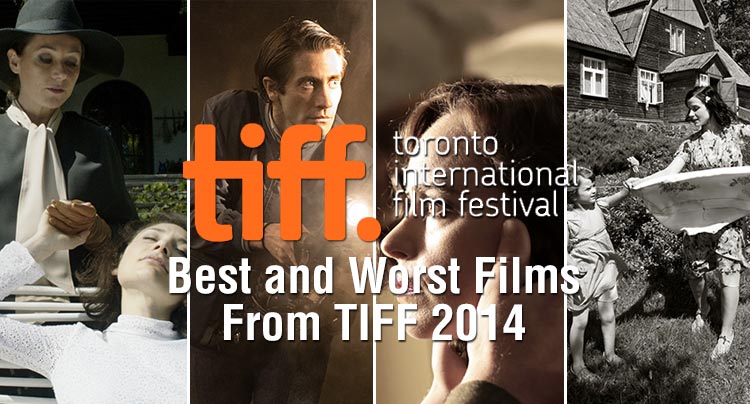
With Toronto now in our rearview mirror, we’ve had time to reflect on which films at the festivals left the greatest impression on us as well as ones that left us with a bad taste (check out our coverage hub). Unlike last year’s 12 Years a Slave or Gravity, the lineup this year seemed to lack a headliner film that everyone flocked towards, but this allowed us to put on our exploring gear to discover some hidden gems. And we certainly found some surprises. We compiled our favorite and most disappointing films of the 2014 Toronto International Film Festival, listing any films we already saw at other festivals like Cannes and SXSW as part of our honorable mentions.
Favorite Films of TIFF 2014
Bird People
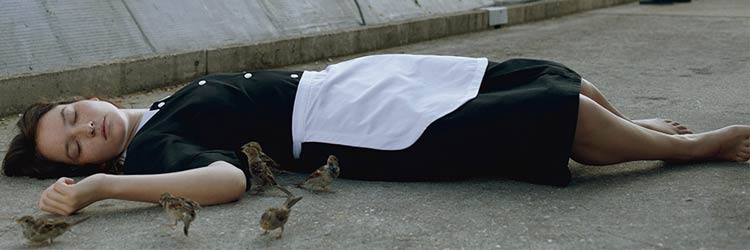
Pascale Ferran’s film defines whimsy, but don’t take that as a red flag. Split into two parts, Bird People (review) tells a similar story through two slightly connected lives. An American businessman on a trip in France makes a major, life-changing decision in the first part, and in the second one of the cleaners at the hotel the American stays at has a life-changing decision made for her. It’s best to go into Bird People not knowing too much, because the shock of where Ferran takes her film is a large part of what makes the experience so pleasurable. By finding an utterly audacious way to tell the same story twice, Bird People serves as a reminder of the limitless possibilities of storytelling. [CJ]
The Duke Of Burgundy
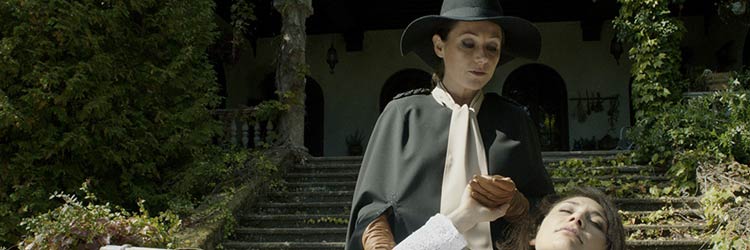
Wonderfully acted, sumptuously shot, vibrantly edited, Peter Strickland’s The Duke Of Burgundy (review) was one of those festival films that floored most critics, and became the unofficial recipient of the “Critic’s Choice Award.” You can count me among those who fell ecstatically in love with this intoxicating and deliciously spirited picture. Tracing the waning stages of a relationship, it may sound conventional on paper but you’ll be hard-pressed to find a single conventional frame here. Chara D’Anna and Sidse Babett Knudsen play lesbian lovers Evelyn and Cynthia, deeply involved in a relationship founded on BDSM and Cynthia’s profession in lepidoptera, and the emotional core of the film is the lovers’ attempt at holding on to the passion that binds them. It’s creative in every imaginable cinematic way, and with US rights secured by IFC Midnight, I urge readers to keep a look out for release date because this is one you won’t want to miss. [Nik]
In the Crosswind
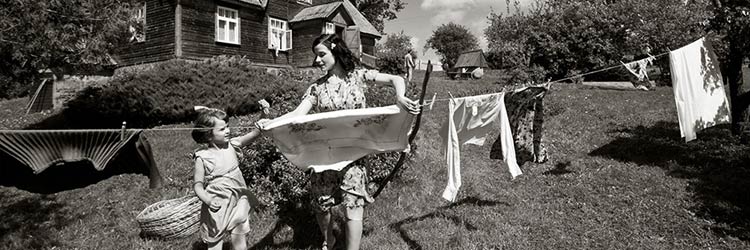
Director Martti Helde’s debut, based on Stalin’s purge of Baltic residents to Siberia, was one of the fest’s more surprising discoveries. Shot in black and white tableaux vivants, the camera slowly floats around each meticulously staged scene (each shot took months of preparation) while the protagonist narrates her experiences. It’s a bold stylistic move that pays off in spades, providing one moving image after another. At its worst, In the Crosswind (review) can be admired for its exquisite cinematography, but it’s much better than an excuse to show off some terrific camerawork. Helde merges the story’s emotional impact with the meticulous staging, delivering something completely unique and awe-inspiring. [CJ]
La Sapienza

Eugène Green’s newest work sounds trite on paper. When a famous architect loses the passion for his livelihood, along with his marriage, he sets off with his wife to study a famous Baroque architect’s work in Italy. A stop along the way has them crossing paths with two young siblings, and their experience with the brother and sister cause the couple to fall back in love again. But leave it to Green, whose formal approach is something entirely his own, to make La Sapienza (review) a thought-provoking, altogether pleasant experience. Even if one can’t adjust to Green’s habit of placing the camera directly in front of his actors, the inventive and evocative ways he films Baroque architecture will surely wow viewers. [CJ]
Nightcrawler
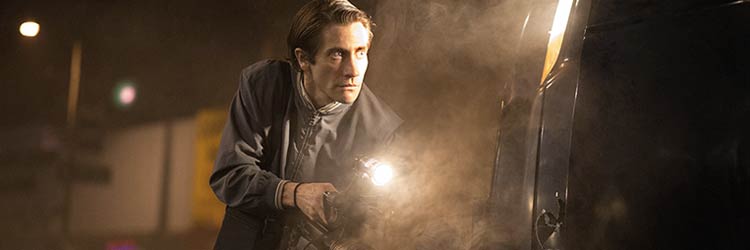
Jake Gyllenhaal plays a creepy thief who stops at nothing to earn himself a buck in Dan Gilory’s directorial debut Nightcrawler. Shot by the extraordinary Robert Elswit (There Will Be Blood, Magnolia), the film shows a side of Los Angeles that you’ve never seen before. Eager to get into any job field that will accept him, Lou Bloom (Gyllenhaal) stumbles into the dark and dirty world of racing ambulances to crime-scenes to capture gruesome footage for local television stations. Gyllenhaal plays a perverse anti-hero who somehow has us rooting for him in more times we care to admit. Nightcrawler keeps you on the edge of your seat with twists and turns down to the very end. For my money, it’s a better version of American Psycho. [Dustin]
Phoenix

Christian Petzold returned to the festival circuit this year, to remind us why he’s one of Germany’s most accomplished and leading directors working today. In a sixth collaboration with his muse Nina Hoss, he has directed the most sophisticated film I saw at TIFF. Phoenix (review) tells the story of Nelly, a Holocaust survivor who returns to her native Berlin to try and piece her broken life back together. She searches for her husband Johnny (Ronald Zehrfeld, also fantastic) who may or may not have betrayed her to the Nazis, and in an intricate narrative, ends up pretending to pretend to be herself. It’s a brilliant storytelling move by Petzold, who explores an identity crisis and symbolizes it in the context of post-war Berlin. The ending is probably the greatest thing Hoss and Petzold ever achieved together; it will eat you alive. [Nik]
A Pigeon Sat On A Branch Reflecting On Existence
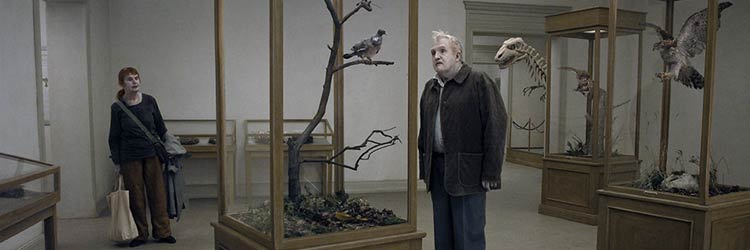
Featured in our Top 15 Most Anticipated films for TIFF, it’s safe to say that Roy Andersson’s Golden Lion winner did not disappoint in the slightest. With a title you just want to hug, A Pigeon Sat On A Branch Reflecting On Existence begins in typical Andersson style; a stationary camera angled at a beige-colored museum room, and a pasty-white overweight man walking around, looking at fossils and relics, with his wife impatiently waiting in the background. One of these fossils turns out to be a dusty pigeon, sitting on a branch, frozen in stuffed reflection. A series of vignettes proceed to flow and connect in Andersson’s philosophizing world full of contemplative, existentialist, and often hilarious, characters and actions. Some of the scenes, including one where two eras meet in a café, are reminiscent of the superior Songs From The Second Floor in their astounding choreography and technical fortitude. For the third part of his trilogy about “being human,” Andersson has proved yet again that he is one of the most fascinating directors working today. [Nik]
The Theory of Everything

Here’s a challenge for you. Try watching the Stephen Hawking biopic The Theory of Everything (review) without shedding a tear. Based off the memoir of Jane Hawking, the film chronicles the life of famed theoretical physicist Stephen Hawking from the time the two met at Cambridge and the difficulties they faced after Stephen was diagnosed with the paralyzing Lou Gherig’s disease. Most people only hear the scientific side of Stephen’s achievements, but this film sheds light on his personal life and the emotional struggles he and Jane went through trying to raise a family while battling a vicious disease. Don’t be surprised if you hear Eddie Redmayne’s name called come Oscar time. Portraying Stephen Hawking before and after the disease required a difficult physical transformation that Redmayne brilliantly performs. It may be a little sappy and conventional at times, but The Theory of Everything remains an incredibly uplifting film about love and hope. [Dustin]
Tokyo Tribe

Sion Sono tops himself yet again which his biggest and most ambitious film to date. Taking place over one night in a dystopian Tokyo run by 23 different gangs, Sono’s hip-hop musical/action/comedy/horror/whatever-you-want-to-call-it throws everything it can on the screen at once. At times overwhelming and exhausting, Tokyo Tribe (review) is nonetheless frequently hilarious and twisted, filled with incredible scenes and violence galore. This might not be the best introduction to Sono’s insanity (last year’s Why Don’t You Play In Hell? might work better for that), but fans of the Japanese madman have no need to worry. Sono continues to fire on all cylinders, and for all we know this could be his masterpiece. [CJ]
Wild Tales

The Argentina film Wild Tales (review) was easily the most fun experience I had at the festival. Consisting of six completely insane short stories, director/writer Damian Szifron takes these episodic segments to hilarious levels by combining pitch-black humor with creative ways to show vengeance. Each story begins with an ordinary situation most people can relate to, but as they unfold Wild Tales shifts into overdrive with exaggerated circumstances filled with irony. For example, one of the stories involves a slow driving hillbilly who serves across lanes so that they only other car on the country highway can’t pass him. When the guy finally manages to pass the slow driver, he makes an explicit gesture towards him and speeds off, only to get a flat tire a few miles later. The scene becomes chaotic and ends on an epic note. Wild Tales is packed with a lot of laughs, claps, visual style, and plenty of shock value that you would expect from a film produced by Pedro Almodóvar. [Dustin]
Most Disappointing Films of TIFF 2014
Cub
Ever read a synopsis for a movie and thought “that sounds so fantastic, it’s almost impossible to mess up,” only to walk away totally disillusioned and disappointed? That’s pretty much exactly what happened to me and this promising Belgian horror film about a 12-year-old boy scout caught in a booby-trapped forest with his troop, trying to avoid the fatal antics of a “wolf-boy” called Kai. Playing in the Midnight Madness, promoted with a tasty festival trailer, Jonas Govaerts’ Cub is, sadly, a neutered, declawed and defanged puppy, completely harmless in terms of true horror. With a unique setting in the woods, in the context of scouts and their “be prepared” motto’s, and the deliciously-sounding booby trap techniques, Cub has all the potential to be an inventive, visceral, experience. It’s nothing of the sort; relying on conventional scares, uninteresting characters, and a painfully flat finale. [Nik]
Mommy
Xavier Dolan wants you to know he’s a serious director. The Quebecois filmmaker with many job titles to his name (including actor, director, writer, producer, and editor, to name a few) made a huge splash this year when Mommy received a rapturous response at Cannes, getting a 12-minute standing ovation and a Jury Prize. Count me as someone who doesn’t get the fervent support around Dolan. With almost no plot or story, Mommy follows a mother and her troubled teenage son around as they befriend their new neighbor. Dolan shoots in a 1:1 aspect ratio, a completely useless gimmick, and tends to repeat a formula of shrill, violent fights between mother and son before dancing the pain away to a poorly chosen pop song played in full. Mommy is bad melodrama, plain and simple, a surprising step down for Dolan after his previous two features, Laurence Anyways and Tom at the Farm, showed a lot more promise. [Nik]
The Voices
The only time I felt the urge to walk out of the theater at the festival was during incredibly underwhelming The Voices. Unfortunately, I didn’t leave early thinking (nay hoping) the film would get better, a decision I would later regret. Jerry Hickfang (Ryan Reynolds) plays a seemingly normal blue-collar worker, but his home life reveals a dark secret behind this disturbed man. He hears the incredibly silly voices from his evil cat and angel-like dog who convince him to do unthinkable things. None of the performances are especially good in the film, which is disappointing considering Ryan Reynolds, Anna Kendrick, and Jacki Weaver were involved. The tone of The Voices is completely inconsistent, beginning with an overly playful musical then shifting into a dark comedy, and eventually ventures to nonsensical horror, without an ounce of cohesiveness. During moments when the film was trying to be funny I found myself laughing at it instead of with it. Despite being a rather stylish film, The Voices is an awkward mess of genre mashing gone horribly wrong. [Dustin]
Honorable Mentions
Other films that are definitely worth checking out that played at TIFF (and other festivals): Adam Wingard’s rapturous and playful The Guest, Palm d’Or winner Winter Sleep, latest from master filmmakers Jean-Pierre and Luc Dardenne Two Days, One Night, 3 and a half hour epic Li’l Quinquin, harrowing street life portrait Heaven Knows What, ambitious and transcending Jauja, and Mike Leigh’s exemplary Mr. Turner.
